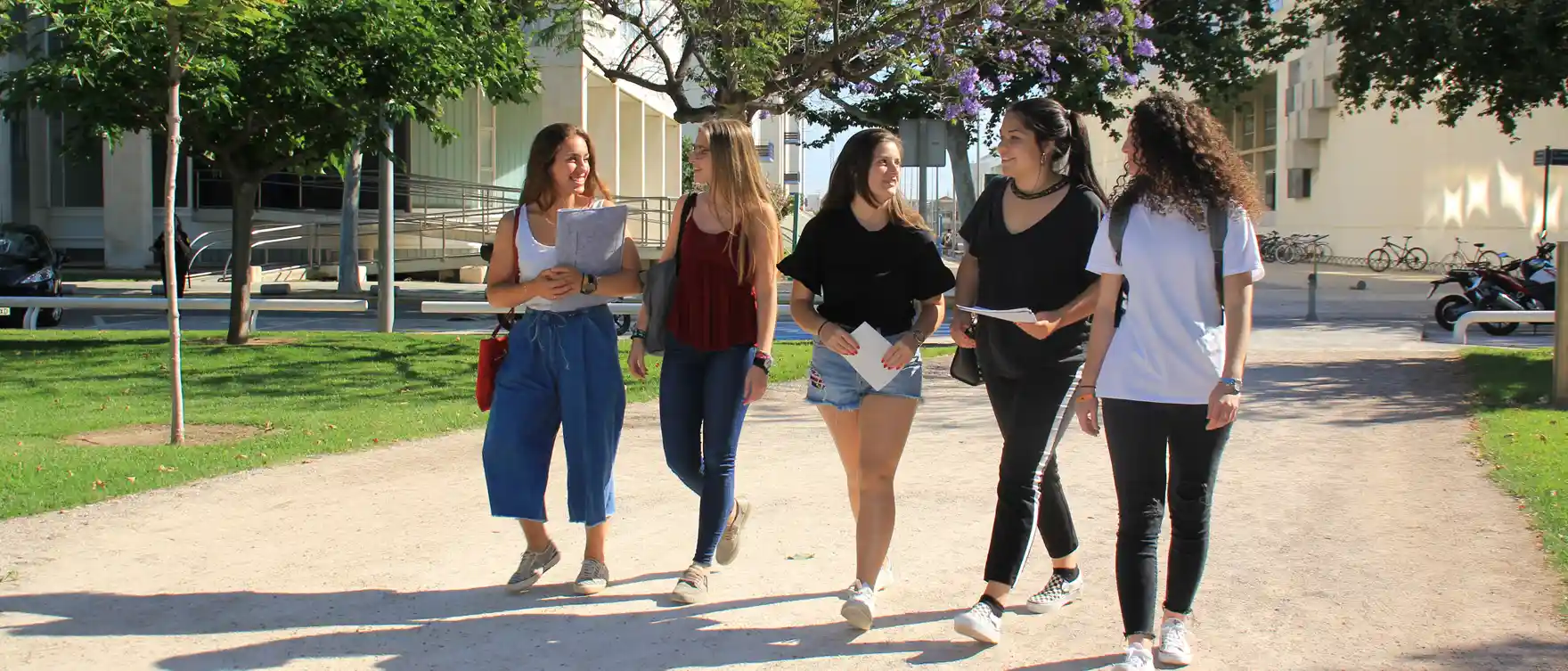Page content
Description of the title
The Master’s Degree in Propulsive Systems for Sustainable Mobility is designed to train highly qualified professionals in the development of efficient and environmentally friendly power plants.
Aligned with the European Union’s “Sustainable and Intelligent Mobility Strategy”, this program addresses the technological revolution needed to reduce emissions in the transport sector.
Students will acquire advanced knowledge in thermo-fluid-dynamic processes, life cycle analysis and experimental techniques, preparing them to face the challenges of sustainable mobility.
With the support of the CMT University Research Institute – Clean Mobility & Thermofluids, graduates will be prepared to contribute to the decarbonization of propulsion systems and the reduction of pollutant emissions in various transportation applications.
Objectives of the degree

Develop more efficient and sustainable propulsion system technologies.

Analyze and reduce pollutant emissions generated by propulsion systems.

Promote the decarbonization of transportation systems through alternative energies.

Implement innovative solutions to improve performance and reduce the acoustic impact of propulsion systems.

To promote critical thinking and research in the field of sustainable mobility.
Career opportunities
The Master’s Degree in Propulsive Systems for Sustainable Mobility prepares its graduates to develop a professional career in various areas related to sustainable mobility.
- Research and development in the automotive and transportation industries
- Environmental consulting in propulsion systems
- Management of technological innovation projects in electric and sustainable mobility.
- Design and optimization of propulsion plants in the aeronautical, maritime and terrestrial sectors.
- Development of public policies for transportation sustainability
- Entrepreneurship in the field of clean and sustainable technologies
Aimed primarily at
This master’s degree is designed for those seeking to expand their knowledge and skills in the field of engineering.
- National and foreign engineering graduates.
Structure of the master’s degree
Credits: 90 ECTS
Mandatory:60 ects |Electives:0 ects |External internships:18 ects |Final Master’s thesis (TFM):12 ects
Fundamentals and tools for the analysis of sustainable propulsion systems :36 ects mandatory
Subject:Fundamentals and context of sustainable propulsion systems
Minimum credits: 13.5 | Character: Compulsory
Subject:Tools for the analysis of sustainable propulsion systems
Minimum credits: 22.5 | Character: Compulsory
Module 2. Technologies for sustainable propulsion systems :24 ects mandatory
Subject:Sustainable propulsion plants
Minimum credits: 24 | Character: Mandatory
Module 3. External academic internships :18 ects compulsory externships
Subject:External academic internships
Minimum credits: 18 | Character: Mandatory External Practice
Note: In this subject a maximum of 18 ECTS can be carried out in external curricular internships (The syllabus contemplates a maximum of 18 ECTS for external curricular internships).
Module 4. Master’s Thesis :12 ects final degree project
Subject:Master’s Thesis
Minimum credits: 12 | Character: Final Degree Project
Internships
During the Master’s Degree in Propulsive Systems for Sustainable Mobility, you will have the opportunity to carry out external internships that will allow you to apply the knowledge acquired in a real professional environment. These internships can be carried out in companies in the sustainable mobility sector, as well as in institutions and initiatives linked to research and development in propulsive systems. This practical component is designed to facilitate the acquisition of experience and key skills, fostering an effective integration between academic training and the workplace.
Research and access to Ph.
This section briefly lists a list of research lines of the master’s program:
- Design and optimization of power plants for land, sea and air transport
- Efficiency of propulsion systems
- Combustion technologies and alternative propulsion technologies
- Environmental impact and life cycle analysis
- Acoustics and noise reduction in propulsion systems
- Thermodynamics applied to transport systems
- Innovations in sustainable mobility and electrification
- Integration of renewable energies in propulsion systems
Academic exchange / agreements with other universities
Students will be able to carry out an academic stay in one of the 97 countries with which the UPV has an agreement. There are more than 1,000 destinations to choose from in Europe (Erasmus scholarships), the United States, Japan, South Korea, China, Australia and Latin America, among others. More than 1,500 UPV students enjoy an exchange every year. If you would like to find out about all the options offered by the master’s degree, please contact the Office of International Exchange Programs.
Facilities and laboratories
The Universitat Politècnica de València offers a set of state-of-the-art facilities and laboratories for the Master’s Degree in Propulsive Systems for Sustainable Mobility, which facilitate practical training and research in the field of sustainable mobility. These facilities include:
- Aerodynamic Laboratory 1
- Aerodynamic Laboratory 2
- Heat Transmission Laboratory
- Gas Turbine Laboratory
- Construction Elements Laboratory 1
- Mass and Energy Transfer Laboratory 2
- Computer Classroom 1
- Engine Testing Laboratory
Master’s Thesis
To obtain the title of Master’s Degree in Propulsive Systems for Sustainable Mobility, you must defend a Master’s Thesis (TFM). This TFM has a value of 12 ECTS credits and will be developed in a semester context.
Its objective is to enable students to apply experimental methodologies to identify cause-effect relationships in propulsive system processes, develop models of relevant physical and chemical processes, and carry out synthesis work to optimize propulsive system performance.
In addition, students are expected to identify aspects that require further deepening of knowledge, providing new ideas and developments in the field of sustainable mobility. The defense of the TFM is a fundamental step to certify the acquisition of professional competences in this field.
Collaborating companies and more
Master’s Degree in Propulsive Systems for Sustainable Mobility has the collaboration of various companies in the sector that contribute their experience and knowledge. Among them are:
- Isover
- PSA Group
- Acciona
- REPSOL
- Siemens
- Volvo
These companies actively participate in the training of students, providing internship opportunities and research projects, as well as contributing to the development of technologies and solutions for more sustainable mobility.

